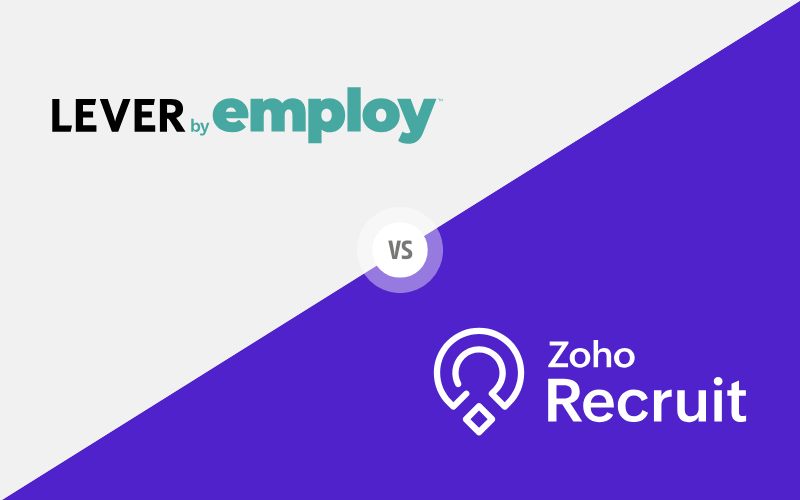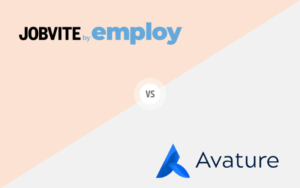When comparing Lever vs Zoho Recruit, organizations can find valuable insights into which Applicant Tracking System (ATS) best suits their hiring needs. This blog post will highlight the key features, strengths, and weaknesses of each platform, focusing on aspects such as user experience, customization options, AI capabilities, and customer support. By examining user testimonials and pricing structures, this guide aims to assist you in making an informed decision that aligns with your organization’s recruitment goals.
Table of Contents
User Interface and User Experience
When evaluating Applicant Tracking Systems (ATS), the user interface (UI) and user experience (UX) play crucial roles in determining the efficiency and satisfaction of both recruiters and candidates. In the Lever vs Zoho Recruit comparison, understanding how each platform approaches UI/UX design is essential for making an informed decision. Both systems aim to streamline the recruitment process, but they do so with distinct approaches that cater to different organizational needs and preferences.

Lever User Interface and User Experience
Lever has gained a reputation for its modern, intuitive interface that appeals to businesses of all sizes. The platform’s design philosophy centers around simplicity and user-friendliness, making it an attractive option for companies that prioritize quick adoption and ease of use.
Key Features of Lever UI/UX:
- Clean and Intuitive Dashboard: Lever’s dashboard provides a clear, at-a-glance view of the recruitment pipeline. The layout is designed to minimize clutter and present key information prominently, allowing recruiters to quickly assess their current workload and priorities.
- Customizable Workflows: Users can tailor the recruitment process to match their organization’s specific needs. This customization extends to creating unique pipelines for different roles or departments, ensuring that each hiring process is optimized for efficiency.
- Mobile Responsiveness: Lever offers a fully responsive design that adapts seamlessly to various devices. The dedicated mobile app for recruiters is particularly noteworthy, providing full functionality for on-the-go hiring managers. This includes the ability to review applications, schedule interviews, and communicate with candidates directly from a smartphone or tablet.
- Candidate-Centric Design: The platform places a strong emphasis on creating a positive candidate experience. This is evident in the streamlined application process, which is designed to be intuitive and user-friendly. Candidates can easily apply through mobile-optimized career sites, often with just a few clicks or by uploading their resume from cloud storage services.
- Visual Pipeline Management: Lever’s visual representation of the candidate pipeline is particularly praised by users. It allows recruiters to drag and drop candidates between stages, providing a clear and interactive way to manage the recruitment process.
- Integrated Communication Tools: The platform incorporates email and messaging functionalities directly into the interface, allowing recruiters to communicate with candidates without leaving the ATS. This integration helps maintain a cohesive record of all interactions.
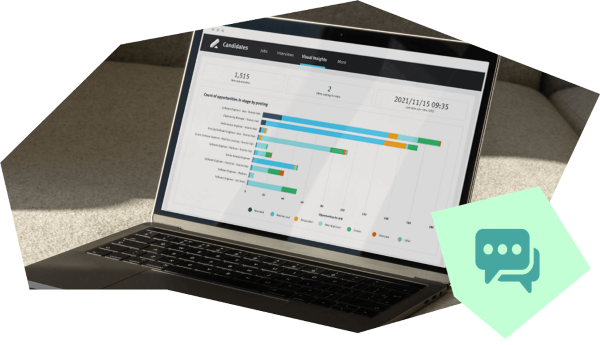
While Lever’s interface is generally lauded for its user-friendliness, some users note that accessing certain advanced features may require additional learning. However, the overall consensus is that the intuitive design significantly reduces the learning curve, especially for new users or smaller teams without dedicated IT support.
Zoho Recruit User Interface and User Experience
Zoho Recruit takes a different approach, offering a comprehensive suite of tools within its interface. This ATS caters to organizations with diverse and potentially complex hiring needs, providing a robust platform capable of handling a wide variety of recruitment processes.
Key Features of Zoho Recruit UI/UX:
- Highly Customizable Interface: Zoho Recruit stands out for its extensive customization options. Users can modify nearly every aspect of the interface to match their specific recruitment processes and company branding. This level of customization allows organizations to create a unique hiring experience that aligns perfectly with their workflow and culture.
- Feature-Rich Dashboard: The system offers a comprehensive dashboard that can be tailored to display a wide range of metrics, tasks, and candidate statuses. This customizability is particularly beneficial for organizations that require detailed tracking and reporting across multiple recruitment channels or departments.
- Advanced Search and Filtering: Zoho Recruit’s interface includes powerful search and filtering capabilities, allowing recruiters to quickly sift through large volumes of candidate data. This feature is particularly useful for organizations dealing with high-volume hiring or managing extensive talent pools.
- Integrated Analytics: The platform incorporates robust analytics tools directly into the user interface. Recruiters can access detailed reports and visualizations without leaving the main dashboard, facilitating data-driven decision-making throughout the hiring process.
- Mobile Accessibility: Zoho Recruit offers mobile access through its app, allowing recruiters to manage tasks remotely. However, some users have reported limitations in the mobile interface, particularly in terms of direct candidate communication. This could be a consideration for teams that heavily rely on mobile functionality.
- Candidate Portal: The customizable candidate portal is a standout feature, allowing companies to create branded experiences for applicants. This includes personalized communication, status updates, and a user-friendly application process that can be tailored to reflect the company’s employer brand.
- Automation Features: Zoho Recruit’s interface incorporates various automation tools, such as resume parsing and email templates, which are easily accessible from the main dashboard. These features can significantly streamline repetitive tasks in the recruitment process.
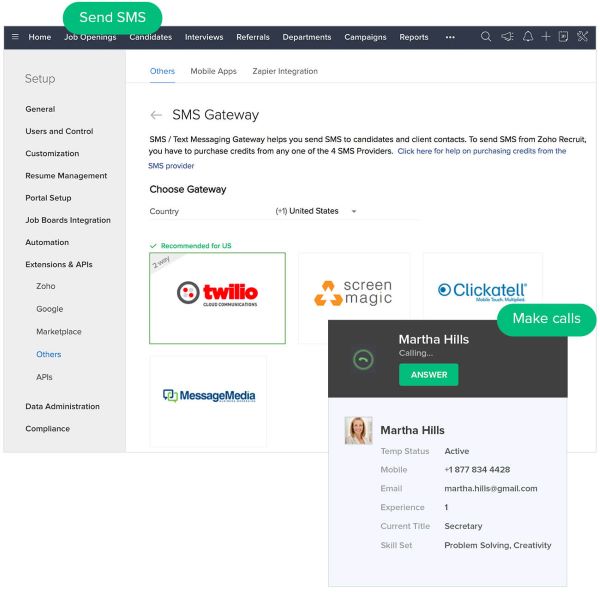
While Zoho Recruit’s extensive feature set is appreciated by many users, particularly those from larger organizations or with complex hiring needs, some reviewers mention that the initial interface can appear information-dense. This richness of features and options might require a steeper learning curve compared to more streamlined systems. However, many users find that the investment in customization and learning pays off in terms of increased functionality and efficiency once the system is fully configured to their needs.
Comparison and Conclusion
When comparing Lever vs Zoho Recruit in terms of UI and UX, it’s clear that both platforms offer strong solutions but with different emphases that may appeal to different types of organizations.
Lever excels in providing a clean, intuitive interface that prioritizes ease of use and efficiency. Its design philosophy focuses on simplicity and visual clarity, making it an excellent choice for organizations that value quick adoption and straightforward processes. The platform’s strengths in mobile responsiveness and streamlined candidate application processes make it particularly suitable for companies looking to enhance their recruitment agility and improve the candidate experience.
Zoho Recruit offers a more feature-rich and highly customizable interface. This makes it an attractive option for organizations with diverse or complex hiring processes or those who prioritize having a highly tailored recruitment experience. The comprehensive dashboard and extensive customization options are particularly beneficial for teams that require detailed tracking, reporting, and the ability to fine-tune every aspect of their recruitment workflow.
In terms of user satisfaction, both platforms perform well, with Lever scoring slightly higher at 5.0 compared to Zoho Recruit’s 4.7 based on user reviews. This slight edge for Lever likely reflects its focus on user-friendliness and intuitive design while Zoho Recruit’s slightly lower score may be attributed to the initial complexity that comes with its extensive feature set.
In summary:
- Lever is ideally suited for organizations seeking a user-friendly, efficient system with strong mobile capabilities and a focus on simplicity. Its intuitive design and streamlined processes make it an excellent choice for teams looking to enhance their recruitment efforts quickly, particularly those who prioritize a smooth candidate experience and easy adoption by recruiters.
- Zoho Recruit is the better choice for companies needing detailed control and extensive customization in their recruitment process. Its robust feature set and ability to create a highly tailored experience for both recruiters and candidates make it well-suited for organizations with diverse hiring needs.
Ultimately, the choice between Lever vs Zoho Recruit in terms of UI and UX will depend on your organization’s specific needs, size, and recruitment complexity. Consider factors such as:
- The technical proficiency of your recruitment team
- The importance of mobile functionality in your hiring process
- The level of customization required for your recruitment workflows
- The volume and diversity of your hiring needs
- The emphasis you place on candidate experience and employer branding
By carefully evaluating these factors against the strengths of each platform, you can select the ATS that will best support your recruitment strategy, enhance productivity, and meet your specific requirements. Remember that while UI and UX are crucial components, they should be considered alongside other features such as integration capabilities, reporting tools, and overall scalability to ensure a holistic fit for your organization.
Core ATS Function
When comparing Lever vs Zoho Recruit, it’s crucial to examine their core Applicant Tracking System (ATS) functions. These fundamental features form the backbone of any recruitment software and significantly impact the efficiency and effectiveness of the hiring process. Let’s delve into how each platform handles essential ATS functions such as job posting, resume parsing, and candidate sourcing.
Lever Core ATS Functions
Lever has built a reputation for streamlining core recruitment processes with a user-friendly approach. The platform offers a comprehensive set of features designed to simplify and accelerate hiring workflows.
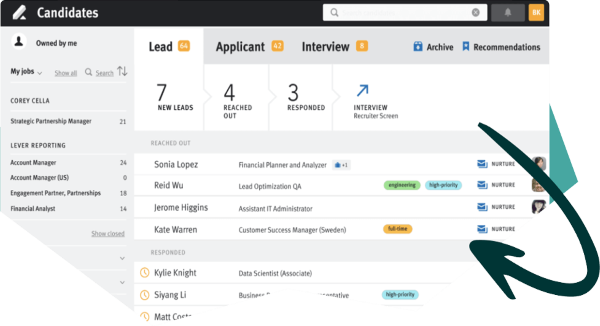
Key Core Functions of Lever:
- Job Posting and Distribution: Lever provides an intuitive job creation interface that allows recruiters to craft and publish job listings quickly. The platform supports multi-channel distribution, enabling users to post jobs across various job boards, social media platforms, and the company’s career site with just a few clicks. Lever’s integration with popular job boards like Indeed and LinkedIn enhances the reach of job postings.
- Resume Parsing and Screening: Lever’s resume parsing technology is designed to extract relevant information from resumes efficiently, populating candidate profiles automatically. The system can handle various file formats, including PDFs and Word documents. Lever’s intelligent screening capabilities allow recruiters to set up custom filters based on specific criteria, helping to identify the most qualified candidates quickly.
- Candidate Sourcing Tools: Lever offers robust sourcing capabilities, including a browser extension that allows recruiters to add potential candidates from professional networks and websites directly into the ATS. The platform also provides tools for creating and managing talent pools, making it easier to nurture relationships with passive candidates over time.
- Application Management: Lever’s application tracking feature provides a clear overview of all applicants in the pipeline. Recruiters can easily move candidates through different stages of the hiring process, add notes, and schedule interviews directly within the platform.
- Collaborative Hiring: The platform emphasizes team collaboration, allowing multiple team members to participate in the hiring process. Features like shared candidate profiles, team feedback forms, and collaborative interview scheduling facilitate a more cohesive hiring approach.
While Lever’s core functions are generally praised for their ease of use and efficiency, some users note that certain advanced customization options may be limited compared to more complex systems.
Zoho Recruit Core ATS Functions
Zoho Recruit offers a comprehensive suite of core ATS functions, catering to organizations with diverse and potentially complex hiring needs. The platform is known for its extensive feature set and high degree of customizability.
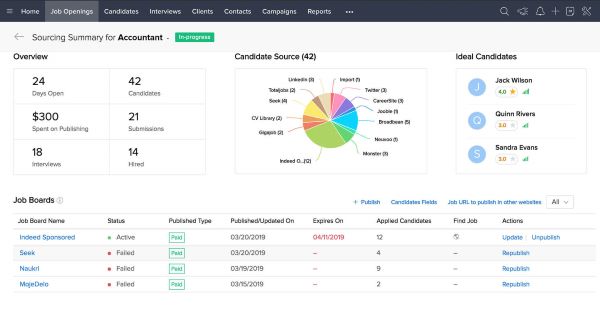
Key Core Functions of Zoho Recruit:
- Job Posting and Distribution: Zoho Recruit provides a versatile job posting system that allows for detailed job descriptions and requirements. The platform supports multi-channel job distribution, including integration with major job boards, social media platforms, and the ability to create custom career sites. Zoho Recruit’s job posting features also include options for internal job postings and employee referral programs.
- Resume Parsing and Screening: The platform employs advanced resume parsing technology capable of extracting and organizing candidate information from various document formats. Zoho Recruit’s screening capabilities include customizable knockout questions and the ability to set up complex filtering rules to automatically rank and sort candidates based on specific criteria.
- Candidate Sourcing Tools: Zoho Recruit offers a range of sourcing tools, including a Chrome extension for adding candidates from online profiles, bulk resume import features, and the ability to create and manage talent pools. The platform also provides advanced search capabilities to help recruiters find candidates within their existing database.
- Application Workflow Management: Zoho Recruit allows for highly customizable application workflows. Recruiters can create multiple stages in the hiring process, set up automated actions and notifications, and track candidates through each step of the recruitment journey.
- Integration Capabilities: One of Zoho Recruit’s strengths is its ability to integrate with a wide range of third-party tools and other Zoho products. This includes integrations with assessment platforms, background check services, and HRIS systems, allowing for a more comprehensive recruitment ecosystem.
While Zoho Recruit’s core functions are extensive and highly customizable, some users report that the initial setup and configuration process can be more complex compared to simpler ATS solutions.
Comparison and Conclusion
In the Lever vs Zoho Recruit comparison of core ATS functions, both platforms offer robust solutions but with different strengths that may appeal to different types of organizations.
Lever stands out for its user-friendly interface and streamlined approach to core ATS functions. Its strengths lie in its intuitive job posting process, efficient resume parsing, and collaborative hiring features. Lever may be particularly appealing to organizations that prioritize ease of use and quick adoption.
Zoho Recruit, on the other hand, offers a more extensive and customizable set of core functions. Its advanced screening capabilities, highly customizable workflows, and strong integration options make it a powerful choice for organizations with complex hiring needs or those requiring a high degree of process customization.
In summary:
- Lever is well-suited for organizations seeking a straightforward, easy-to-use ATS with strong collaborative features and efficient core functions.
- Zoho Recruit is ideal for companies that need detailed control over their recruitment processes and value extensive customization options in their core ATS functions.
When choosing between Lever vs Zoho Recruit, consider your organization’s specific needs, the complexity of your hiring processes, and the level of customization you require in your ATS. Both platforms offer strong core ATS functions, but the best choice will depend on your unique recruitment requirements and organizational preferences.
Applicant Management
Effective applicant management is a crucial aspect of any Applicant Tracking System (ATS). When comparing Lever vs Zoho Recruit, it’s essential to examine how each platform handles the organization, tracking, and communication with candidates throughout the hiring process. Let’s explore the applicant management features of both systems, focusing on candidate pipeline visualization, communication tools, and interview scheduling capabilities.
Lever Applicant Management
Lever has built a reputation for its intuitive and visually appealing approach to applicant management, designed to streamline the recruitment process and enhance collaboration among hiring teams.
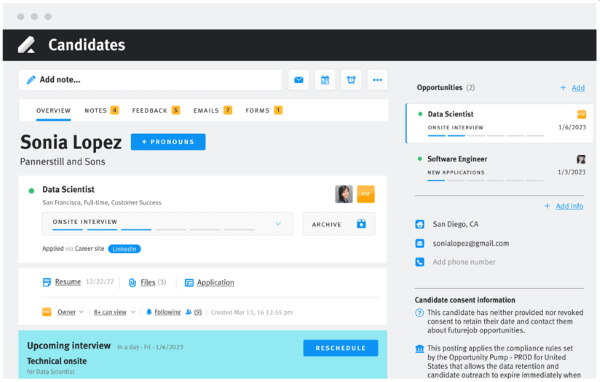
Key Applicant Management Features of Lever:
- Candidate Pipeline Visualization: Lever offers a highly visual and interactive candidate pipeline. Recruiters can easily drag and drop candidates between different stages, providing a clear overview of the hiring process. The pipeline view is customizable, allowing teams to create stages that align with their specific recruitment workflow.
- Communication Tools: Lever integrates email functionality directly into the platform, enabling recruiters to communicate with candidates without leaving the ATS. The system also supports email templates and automated follow-ups, helping to maintain consistent and timely communication. While Lever doesn’t offer native SMS functionality, it does provide integration options with third-party texting services.
- Interview Scheduling: The platform features a robust interview scheduling system that syncs with popular calendar applications like Google Calendar and Outlook. Lever’s scheduling tool allows for easy coordination of complex interview panels, including the ability to suggest multiple time slots to candidates and automatically find common availability among interviewers.
- Candidate Profiles: Lever creates comprehensive candidate profiles that consolidate all relevant information, including resumes, application details, interview feedback, and communication history. This centralized view helps recruiters make informed decisions quickly.
- Collaborative Feedback: The platform emphasizes team collaboration with features like shared notes, standardized feedback forms, and the ability to @mention team members for quick input. This collaborative approach helps ensure that all stakeholders are aligned throughout the hiring process.
While Lever’s applicant management features are generally praised for their user-friendliness and visual appeal, some users note that certain advanced customization options may be limited compared to more complex systems.
Zoho Recruit Applicant Management
Zoho Recruit offers a comprehensive and highly customizable approach to applicant management, catering to organizations with diverse and potentially complex hiring needs.
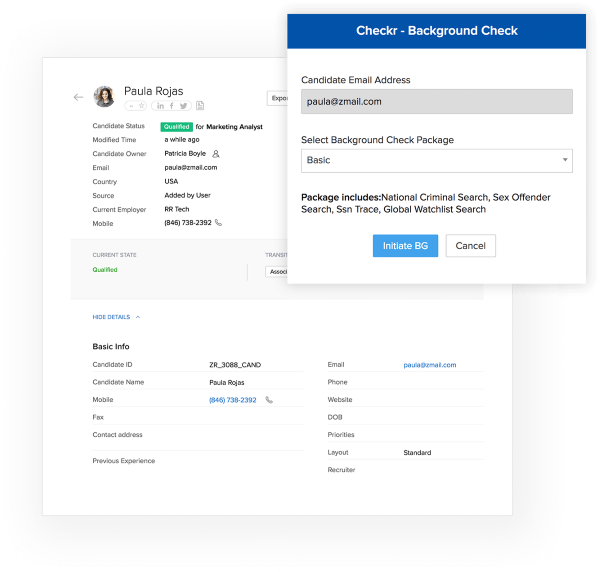
Key Applicant Management Features of Zoho Recruit:
- Candidate Pipeline Visualization: Zoho Recruit provides a customizable kanban-style board for visualizing the candidate pipeline. Users can create multiple pipelines for different job types or departments, offering flexibility in managing various recruitment processes simultaneously. The system allows for easy movement of candidates between stages and provides detailed status updates.
- Communication Tools: The platform offers integrated email functionality with customizable templates and the ability to track email opens and clicks. Zoho Recruit also includes native SMS capabilities, allowing recruiters to send text messages directly from the platform. The system maintains a comprehensive communication log for each candidate, ensuring all interactions are documented.
- Interview Scheduling: Zoho Recruit features an advanced interview scheduling system that integrates with various calendar applications. The platform supports both one-on-one and panel interviews, with the ability to send automated reminders to both candidates and interviewers. It also offers a self-scheduling option for candidates, reducing the back-and-forth typically involved in finding suitable interview times.
- Candidate Profiles: The system creates detailed candidate profiles that include all relevant information, from application details to assessment results and interview feedback. Zoho Recruit’s profiles are highly customizable, allowing organizations to capture and display the specific information most relevant to their hiring processes.
- Automation Capabilities: Zoho Recruit offers extensive automation options for applicant management. Users can set up automated actions based on specific triggers, such as automatically moving candidates to the next stage upon completing an assessment or sending follow-up emails after a certain period of inactivity.
While Zoho Recruit’s applicant management features are comprehensive and highly customizable, some users report that the initial setup and configuration process can be more complex compared to simpler ATS solutions.
Comparison and Conclusion
In the Lever vs Zoho Recruit comparison of applicant management features, both platforms offer robust solutions but with different strengths that may appeal to different types of organizations.
Lever stands out for its user-friendly interface and visually appealing candidate pipeline. Its strengths lie in its intuitive design, collaborative features, and streamlined communication tools. Lever may be particularly appealing to organizations that prioritize ease of use and team collaboration in their applicant management process.
Zoho Recruit, on the other hand, offers a more extensive and customizable set of applicant management features. Its advanced automation capabilities, native SMS functionality, and highly flexible pipeline management make it a powerful choice for organizations with complex hiring needs or those requiring a high degree of process customization.
In summary:
- Lever is well-suited for organizations seeking a visually intuitive, collaboration-focused applicant management system that’s easy to adopt and use.
- Zoho Recruit is ideal for companies that need detailed control over their applicant management processes and value extensive customization and automation options.
When choosing between Lever vs Zoho Recruit for applicant management, consider your organization’s specific needs, the complexity of your hiring processes, and the level of customization you require. Both platforms offer strong applicant management features, but the best choice will depend on your unique recruitment requirements and organizational preferences.
Recruitment Marketing
In the competitive landscape of talent acquisition, recruitment marketing has become a crucial strategy for attracting top candidates. When comparing Lever vs Zoho Recruit, it’s important to examine how each platform supports and enhances recruitment marketing efforts. Let’s explore the key features and capabilities of both systems in this area.
Lever Recruitment Marketing
Lever offers a range of recruitment marketing tools designed to help organizations attract and engage potential candidates effectively.
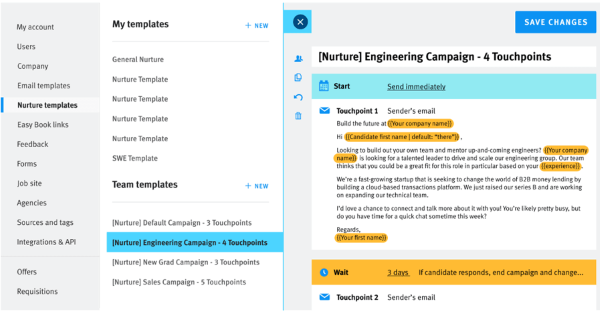
Key Recruitment Marketing Features of Lever:
- Career Site Builder: Lever provides a customizable career site builder that allows companies to create branded, mobile-responsive career pages. These pages can be easily updated with new job postings, company culture information, and employee testimonials, helping to showcase the employer brand effectively.
- Social Media Integration: The platform offers seamless integration with various social media channels, allowing recruiters to share job postings and company content across platforms like LinkedIn, Facebook, and Twitter. This feature helps extend the reach of job advertisements and employer branding content.
- Employee Referral Programs: Lever includes tools to set up and manage employee referral programs. These features make it easy for current employees to refer candidates, track referrals, and even gamify the process to encourage participation.
- Candidate Relationship Management (CRM): Lever’s CRM capabilities allow recruiters to nurture relationships with passive candidates over time. This includes features for segmenting talent pools, sending targeted communications, and tracking engagement.
- Email Marketing Campaigns: The platform supports the creation and management of email marketing campaigns to keep candidates informed about new opportunities and company updates. These campaigns can be personalized based on candidate data and interests.
While Lever’s recruitment marketing features are generally user-friendly and effective, some users note that advanced marketing automation capabilities may be limited compared to specialized marketing platforms.
Zoho Recruit Recruitment Marketing
Zoho Recruit offers a comprehensive suite of recruitment marketing tools, leveraging its integration with other Zoho products to provide robust marketing capabilities.
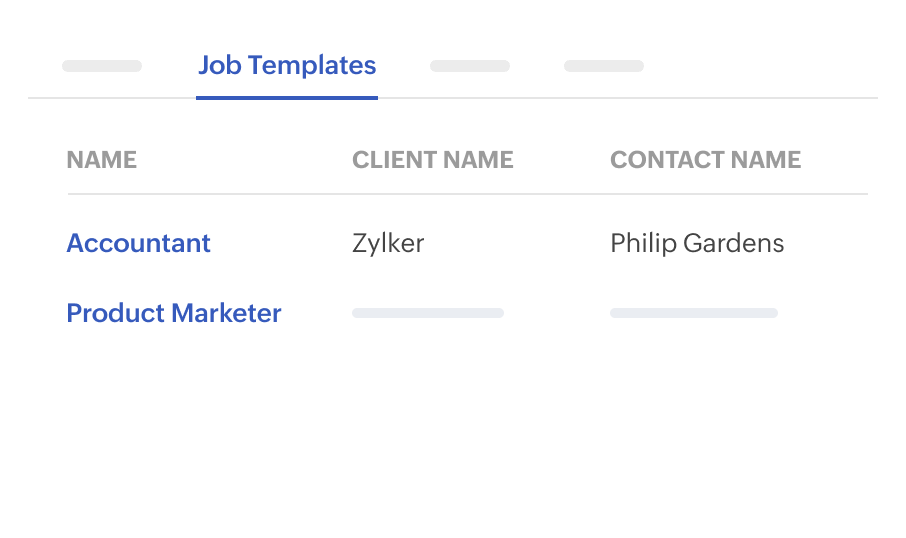
Key Recruitment Marketing Features of Zoho Recruit:
- Custom Career Page Builder: Zoho Recruit allows users to create and customize branded career pages. The builder includes drag-and-drop functionality, making it easy to design attractive, mobile-responsive pages that reflect the company’s brand and culture.
- Social Media Management: The platform provides tools for managing social media recruitment efforts across multiple channels. This includes scheduling posts, tracking engagement, and analyzing the performance of social media recruitment campaigns.
- Advanced Employee Referral System: Zoho Recruit offers a sophisticated employee referral program that includes features like referral tracking, automated rewards, and analytics to measure the program’s effectiveness.
- Candidate Nurturing Tools: The system includes features for building and maintaining talent pools, allowing recruiters to segment candidates based on various criteria and send targeted communications to keep them engaged over time.
- Marketing Automation: Leveraging its integration with Zoho Marketing Hub, Zoho Recruit offers advanced marketing automation capabilities. This includes features for creating multi-channel marketing campaigns, A/B testing, and detailed analytics.
- SEO Optimization: Zoho Recruit provides tools to optimize career pages and job postings for search engines, helping to increase visibility in job search results.
While Zoho Recruit’s recruitment marketing features are comprehensive and highly customizable, some users report that the initial setup and configuration process can be complex, especially when integrating with other Zoho products for advanced marketing functionalities.
Comparison and Conclusion
In the Lever vs Zoho Recruit comparison of recruitment marketing features, both platforms offer strong solutions but with different strengths that may appeal to different types of organizations.
Lever stands out for its user-friendly interface and streamlined approach to recruitment marketing. Its strengths lie in its intuitive career site builder, easy-to-use social media integration, and effective candidate relationship management tools. Lever may be particularly appealing to organizations that prioritize ease of use and quick implementation of recruitment marketing strategies.
Zoho Recruit, on the other hand, offers a more extensive and customizable set of recruitment marketing features. Its advanced marketing automation capabilities, robust employee referral system, and strong integration with other marketing tools make it a powerful choice for organizations with complex recruitment marketing needs or those requiring a high degree of campaign customization.
In summary:
- Lever is well-suited for organizations seeking a straightforward, easy-to-implement recruitment marketing solution with strong employer branding and candidate engagement features.
- Zoho Recruit is ideal for companies that need detailed control over their recruitment marketing processes and value extensive customization options, particularly those already using other Zoho products.
When choosing between Lever vs Zoho Recruit for recruitment marketing, consider your organization’s specific needs, the complexity of your marketing strategies, and the level of integration you require with other marketing tools. Both platforms offer strong recruitment marketing features, but the best choice will depend on your unique recruitment requirements and organizational preferences.
Collaboration Tools
In modern recruitment processes, effective collaboration among team members is crucial for making informed hiring decisions. When comparing Lever vs Zoho Recruit, it’s important to examine how each platform facilitates teamwork and communication. Let’s explore the collaboration tools offered by both systems, focusing on team feedback, evaluation features, and internal messaging capabilities.
Lever Collaboration Tools
Lever has built a strong reputation for its collaborative approach to recruitment, offering tools that promote teamwork and streamline communication throughout the hiring process.
Key Collaboration Features of Lever:
- Team Feedback and Evaluation: Lever provides a structured feedback system that allows team members to submit standardized evaluations after interviews. These forms can be customized to align with specific job requirements or company values, ensuring consistent and relevant feedback across all interviewers.
- @Mentions and Notifications: The platform incorporates an @mention feature, allowing users to tag colleagues in comments or notes, instantly notifying them of important updates or requests for input. This feature helps keep all team members in the loop and promotes quick responses to time-sensitive matters.
- Collaborative Hiring Pipelines: Lever’s visual pipeline allows multiple team members to view and interact with candidate profiles simultaneously. This shared view ensures that everyone involved in the hiring process has access to the same up-to-date information.
- Internal Messaging and Notes: The system includes a robust internal messaging feature, enabling recruiters and hiring managers to communicate directly within the platform. Users can add notes to candidate profiles, which are visible to all team members with appropriate permissions, facilitating information sharing and collaborative decision-making.
- Interview Scheduling Coordination: Lever’s scheduling tools allow for easy coordination among multiple interviewers, helping to streamline the often complex process of arranging panel interviews or multi-stage assessments.
While Lever’s collaboration tools are generally praised for their intuitive design and ease of use, some users note that more advanced project management features may be limited compared to specialized collaboration platforms.
Zoho Recruit Collaboration Tools
Zoho Recruit offers a comprehensive suite of collaboration tools, leveraging its integration with other Zoho products to provide robust team communication and coordination features.
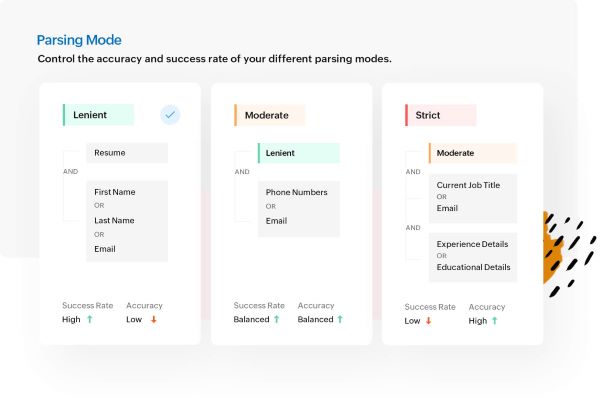
Key Collaboration Features of Zoho Recruit:
- Team Feedback and Evaluation: Zoho Recruit includes customizable interview scorecards and evaluation forms. These allow team members to provide structured feedback on candidates, which can be easily compared and analyzed to support hiring decisions.
- Internal Chat and Messaging: The platform features a built-in chat system, allowing team members to communicate in real-time without leaving the ATS. This includes both one-on-one and group chat options, facilitating quick discussions and decision-making.
- Task Management: Zoho Recruit incorporates task assignment and tracking features, enabling recruiters to delegate responsibilities and monitor progress throughout the hiring process. This helps ensure that all team members are aware of their roles and deadlines.
- Collaborative Candidate Profiles: The system allows multiple users to access and update candidate profiles simultaneously. Team members can add notes, upload documents, and track all interactions, creating a comprehensive and collaborative view of each candidate.
- Integration with Zoho Cliq: For organizations using other Zoho products, Zoho Recruit integrates seamlessly with Zoho Cliq, a team communication tool. This integration allows for more advanced collaboration features, including video conferencing and file sharing.
- Automated Notifications: Zoho Recruit offers customizable notification settings, ensuring that team members are automatically informed of important updates or required actions in the recruitment process.
While Zoho Recruit’s collaboration tools are comprehensive and highly customizable, some users report that the initial setup and configuration process can be complex, especially when integrating with other Zoho products for advanced collaboration functionalities.
Comparison and Conclusion
In the Lever vs Zoho Recruit comparison of collaboration tools, both platforms offer strong solutions but with different strengths that may appeal to different types of organizations.
Lever stands out for its user-friendly interface and streamlined approach to collaboration. Its strengths lie in its intuitive feedback system, visual hiring pipelines, and easy-to-use internal messaging features. Lever may be particularly appealing to organizations that prioritize quick adoption and seamless teamwork in their recruitment process.
Zoho Recruit, on the other hand, offers a more extensive and customizable set of collaboration tools. Its advanced task management capabilities, integration with other Zoho products, and robust internal communication features make it a powerful choice for organizations with complex collaboration needs or those requiring a high degree of process customization.
In summary:
- Lever is well-suited for organizations seeking a straightforward, easy-to-use collaboration solution that promotes quick adoption and efficient teamwork in the hiring process.
- Zoho Recruit is ideal for companies that need detailed control over their collaboration processes and value extensive customization options, particularly those already using other Zoho products.
When choosing between Lever vs Zoho Recruit for collaboration tools, consider your organization’s specific needs, the complexity of your hiring processes, and the level of integration you require with other team communication tools. Both platforms offer strong collaboration features, but the best choice will depend on your unique recruitment requirements and organizational preferences.
Onboarding Integration
Effective onboarding is crucial for ensuring new hires transition smoothly into their roles. When comparing Lever vs Zoho Recruit, it’s important to examine how each platform supports the onboarding process through integration with HR systems and automation of new hire paperwork. Let’s explore the onboarding integration capabilities of both systems.
Lever Onboarding Integration
Lever offers several features to streamline the transition from recruitment to onboarding, focusing on seamless handoffs and efficient paperwork management.
Key Onboarding Integration Features of Lever:
- Offer Letter Management: Lever provides tools for creating, sending, and tracking offer letters directly within the platform. Users can customize offer letter templates and automate the sending process based on specific triggers in the hiring workflow.
- E-Signature Integration: The platform integrates with popular e-signature tools, allowing new hires to sign offer letters and other important documents electronically. This feature significantly reduces the time and paperwork involved in the hiring process.
- New Hire Paperwork Automation: Lever offers basic automation for new hire paperwork, allowing recruiters to send pre-configured document packages to successful candidates. This helps ensure that all necessary forms are completed before the new hire’s start date.
- HRIS Integration: Lever integrates with various Human Resource Information Systems (HRIS), facilitating the transfer of candidate data from the ATS to the HRIS once a hire is made. This integration helps reduce data entry errors and streamlines the onboarding process.
- Onboarding Checklists: The platform includes customizable onboarding checklists, helping HR teams and hiring managers track the progress of new hire tasks and ensure all necessary steps are completed.
While Lever’s onboarding integration features are generally user-friendly and effective for basic onboarding needs, some users note that more advanced onboarding functionalities may require additional third-party integrations.
Zoho Recruit Onboarding Integration
Zoho Recruit offers comprehensive onboarding integration capabilities, leveraging its connection with other Zoho products to provide a more extensive onboarding solution.
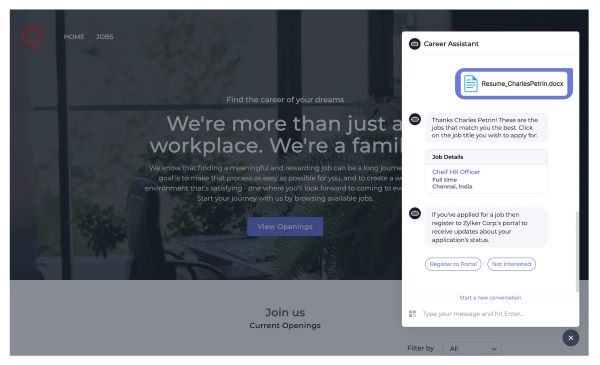
Key Onboarding Integration Features of Zoho Recruit:
- Advanced Offer Management: Zoho Recruit includes a robust offer management system that allows for the creation, approval, and tracking of offer letters. The platform supports multiple offer types and can automate the offer process based on predefined rules.
- Digital Signature Capabilities: The system includes built-in digital signature functionality, eliminating the need for third-party e-signature tools. This feature allows new hires to sign offer letters and other documents securely within the platform.
- Comprehensive New Hire Paperwork Automation: Zoho Recruit offers extensive automation for new hire paperwork, including the ability to create custom forms, set up document workflows, and track completion status. The system can automatically trigger the sending of required documents based on the candidate’s progress through the hiring pipeline.
- Deep HRIS Integration: For organizations using Zoho People (Zoho’s HRIS), Zoho Recruit offers seamless integration, allowing for a smooth transfer of candidate data to employee records. The platform also supports integration with other popular HRIS systems.
- Onboarding Portal: Zoho Recruit provides a dedicated onboarding portal for new hires, where they can access all necessary information, complete required documents, and engage with pre-boarding activities.
- Customizable Onboarding Workflows: The platform allows for the creation of detailed, customizable onboarding workflows that can be tailored to different roles or departments, ensuring a consistent and comprehensive onboarding experience for all new hires.
While Zoho Recruit’s onboarding integration features are comprehensive and highly customizable, some users report that the initial setup and configuration process can be complex, especially when integrating with other Zoho products for advanced onboarding functionalities.
Comparison and Conclusion
In the Lever vs Zoho Recruit comparison of onboarding integration features, both platforms offer solutions to streamline the transition from candidate to employee, but with different strengths that may appeal to different types of organizations.
Lever stands out for its user-friendly interface and straightforward approach to onboarding integration. Its strengths lie in its easy-to-use offer letter management, basic paperwork automation, and seamless HRIS integrations. Lever may be particularly appealing to organizations that prioritize simplicity and quick implementation in their onboarding process.
Zoho Recruit, on the other hand, offers a more extensive and customizable set of onboarding integration features. Its advanced offer management, comprehensive paperwork automation, and dedicated onboarding portal make it a powerful choice for organizations with complex onboarding needs or those requiring a high degree of process customization.
In summary:
- Lever is well-suited for organizations seeking a straightforward, easy-to-implement onboarding integration solution that covers the basics effectively and integrates well with various HRIS systems.
- Zoho Recruit is ideal for companies that need detailed control over their onboarding processes and value extensive customization options, particularly those already using other Zoho products like Zoho People.
When choosing between Lever vs Zoho Recruit for onboarding integration, consider your organization’s specific needs, the complexity of your onboarding processes, and the level of integration you require with your existing HR systems. Both platforms offer strong onboarding integration features, but the best choice will depend on your unique requirements and organizational preferences.
Reporting and Analytics
In today’s data-driven recruitment landscape, robust reporting and analytics capabilities are essential for making informed decisions and optimizing hiring processes. When comparing Lever vs Zoho Recruit, it’s crucial to examine how each platform handles recruitment metrics, KPIs, and custom report generation. Let’s explore the reporting and analytics features offered by both systems.
Lever Reporting and Analytics
Lever provides a range of reporting and analytics tools designed to give users insights into their recruitment processes and outcomes.
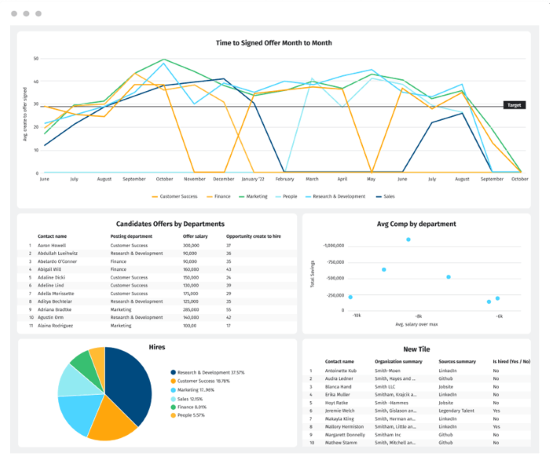
Key Reporting and Analytics Features of Lever:
- Pre-built Reports: Lever offers a variety of pre-configured reports covering key recruitment metrics such as time-to-hire, source effectiveness, and pipeline velocity. These reports are designed to be easily accessible and understandable, providing quick insights into recruitment performance.
- Custom Report Builder: The platform includes a custom report builder that allows users to create tailored reports based on specific data points and metrics. This feature enables organizations to track and analyze metrics that are most relevant to their unique hiring goals.
- Visual Data Representation: Lever presents data through visually appealing charts and graphs, making it easier for users to interpret trends and patterns in their recruitment data.
- Recruitment Funnel Analytics: The system provides detailed analytics on the recruitment funnel, allowing users to identify bottlenecks and optimize each stage of the hiring process.
- Source Attribution: Lever offers robust source attribution reporting, helping organizations understand which candidate sources are most effective for different roles or departments.
- Real-time Dashboards: Users can access real-time dashboards that provide up-to-date information on key recruitment metrics, enabling quick decision-making and agile process adjustments.
While Lever’s reporting and analytics features are generally user-friendly and provide good insights, some users note that more advanced statistical analysis capabilities may be limited compared to specialized analytics platforms.
Zoho Recruit Reporting and Analytics
Zoho Recruit offers a comprehensive suite of reporting and analytics tools, leveraging its integration with other Zoho products to provide advanced data analysis capabilities.
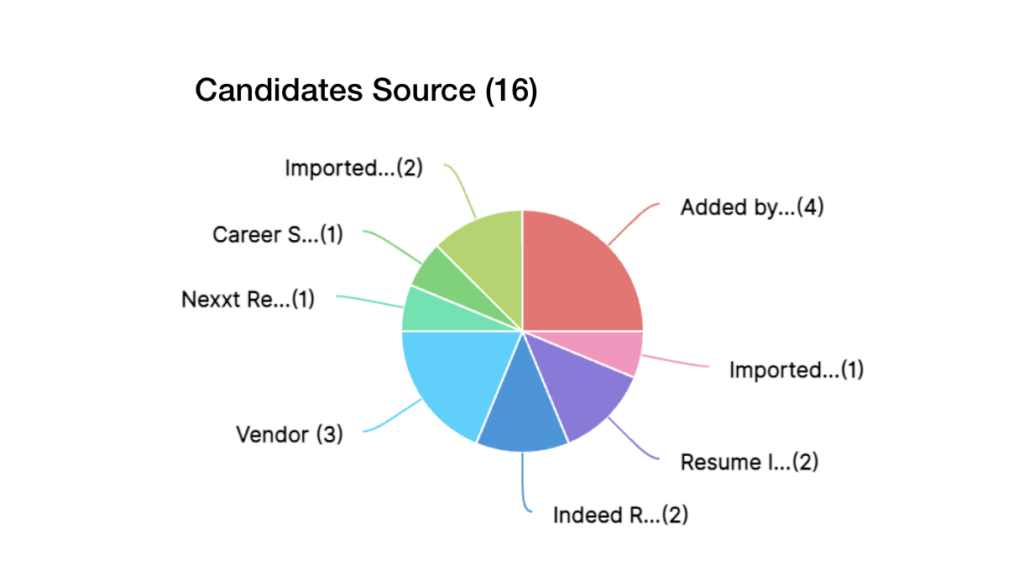
Key Reporting and Analytics Features of Zoho Recruit:
- Extensive Pre-built Reports: Zoho Recruit includes a wide range of pre-configured reports covering various aspects of the recruitment process, from candidate sourcing to offer acceptance rates. These reports can be easily customized to suit specific needs.
- Advanced Custom Report Generator: The platform provides a powerful custom report generator that allows users to create complex, multi-dimensional reports. This feature supports advanced filtering, grouping, and data manipulation options.
- Interactive Dashboards: Zoho Recruit offers highly interactive dashboards that can be customized to display the most relevant metrics for different users or roles. These dashboards support drill-down functionality for deeper data exploration.
- Predictive Analytics: Leveraging AI capabilities, Zoho Recruit provides predictive analytics features that can forecast hiring trends, estimate time-to-fill for open positions, and suggest optimal candidate sources based on historical data.
- Recruitment Metrics Library: The system includes a comprehensive library of recruitment metrics and KPIs, ensuring that users have access to industry-standard measurements alongside their custom metrics.
- Data Visualization Tools: Zoho Recruit offers advanced data visualization options, allowing users to create compelling visual representations of their recruitment data through various chart types and infographics.
- Integration with Zoho Analytics: For users requiring even more advanced analytics capabilities, Zoho Recruit integrates seamlessly with Zoho Analytics, providing access to powerful business intelligence and data analysis tools.
While Zoho Recruit’s reporting and analytics features are comprehensive and highly customizable, some users report that the initial setup and configuration process can be complex, especially when leveraging advanced analytics functionalities.
Comparison and Conclusion
In the Lever vs Zoho Recruit comparison of reporting and analytics features, both platforms offer strong solutions but with different strengths that may appeal to different types of organizations.
Lever stands out for its user-friendly interface and straightforward approach to reporting and analytics. Its strengths lie in its easily accessible pre-built reports, intuitive custom report builder, and visually appealing data representation. Lever may be particularly appealing to organizations that prioritize quick insights and ease of use in their recruitment analytics.
Zoho Recruit, on the other hand, offers a more extensive and customizable set of reporting and analytics features. Its advanced custom report generator, predictive analytics capabilities, and integration with Zoho Analytics make it a powerful choice for organizations with complex data analysis needs or those requiring a high degree of customization in their recruitment reporting.
In summary:
- Lever is well-suited for organizations seeking a straightforward, easy-to-use reporting and analytics solution that provides quick insights into key recruitment metrics and supports basic custom reporting needs.
- Zoho Recruit is ideal for companies that require detailed and advanced analytics capabilities, value extensive customization options in their reporting, and potentially need integration with more comprehensive business intelligence tools.
When choosing between Lever vs Zoho Recruit for reporting and analytics, consider your organization’s specific data analysis needs, the complexity of your recruitment processes, and the level of customization you require in your reports. Both platforms offer strong reporting and analytics features, but the best choice will depend on your unique requirements and the depth of insights you need to drive your recruitment strategy.
Compliance and Data Security
In the comparison of Lever vs Zoho Recruit, compliance and data security are critical factors that organizations must consider. Both platforms offer features to help companies adhere to regulatory requirements and protect sensitive candidate information. Let’s examine how each system addresses these crucial aspects of modern recruitment.
Lever Compliance and Data Security
Lever has implemented various measures to ensure compliance with data protection regulations and maintain robust security standards.
Key Compliance and Data Security Features of Lever:
- GDPR and CCPA Compliance: Lever is designed to help organizations meet the requirements of major data protection regulations such as the General Data Protection Regulation (GDPR) and the California Consumer Privacy Act (CCPA). The platform includes features for data subject access requests, consent management, and data retention policies.
- Data Encryption: Lever employs industry-standard encryption protocols to protect data both in transit and at rest. This includes SSL/TLS encryption for data in transit and AES-256 encryption for data stored on their servers.
- Access Controls: The platform offers role-based access controls, allowing organizations to restrict data access based on user roles and responsibilities. This helps ensure that sensitive candidate information is only accessible to authorized personnel.
- Regular Security Audits: Lever conducts regular security audits and assessments to identify and address potential vulnerabilities in their system. They also maintain SOC 2 Type II compliance, demonstrating their commitment to data security.
- Data Backup and Recovery: The platform implements robust data backup and disaster recovery procedures to ensure data integrity and availability in case of system failures or other incidents.
While Lever provides solid compliance and security features, some users note that more advanced customization options for compliance settings may be limited compared to enterprise-grade solutions.
Zoho Recruit Compliance and Data Security
Zoho Recruit offers a comprehensive suite of compliance and data security features, leveraging Zoho’s extensive experience in handling sensitive business data.
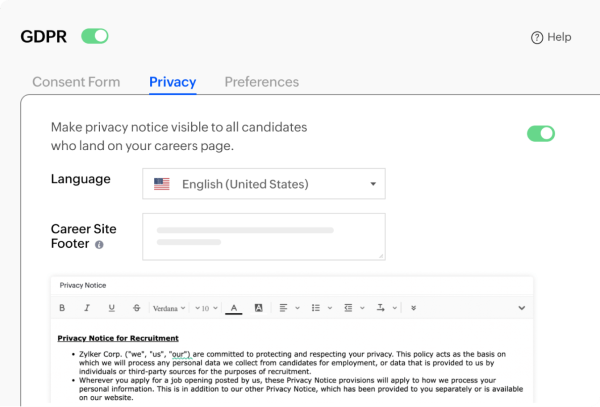
Key Compliance and Data Security Features of Zoho Recruit:
- Comprehensive Regulatory Compliance: Zoho Recruit is designed to help organizations comply with various data protection regulations, including GDPR, CCPA, and HIPAA. The platform offers features such as data anonymization, consent management, and data portability to meet these regulatory requirements.
- Advanced Encryption: Zoho Recruit uses multiple layers of encryption, including AES-256 for data at rest and TLS 1.2 for data in transit. They also offer the option for customer-managed encryption keys for an additional layer of security.
- Granular Access Controls: The system provides detailed access control settings, allowing organizations to define precise permissions for different user roles. This includes the ability to set field-level security, ensuring that sensitive data is only visible to authorized users.
- Regular Security Assessments: Zoho conducts frequent security assessments, including penetration testing and vulnerability scans, to ensure the ongoing security of their platforms. They maintain various security certifications, including ISO 27001 and SOC 2 Type II.
- Data Residency Options: For organizations with specific data residency requirements, Zoho Recruit offers options to choose the geographic location where data is stored and processed.
- Audit Trails: The platform maintains detailed audit logs of all system activities, helping organizations track and monitor user actions for compliance and security purposes.
While Zoho Recruit’s compliance and data security features are comprehensive, some users report that the initial setup and configuration of these features can be complex, especially for organizations with unique compliance requirements.
Comparison and Conclusion
In the Lever vs Zoho Recruit comparison of compliance and data security features, both platforms offer strong solutions to help organizations meet regulatory requirements and protect sensitive data. However, they have different strengths that may appeal to different types of organizations.
Lever stands out for its user-friendly approach to compliance and security. Its strengths lie in its straightforward implementation of GDPR and CCPA compliance features, robust encryption protocols, and regular security audits. Lever may be particularly appealing to organizations that prioritize ease of use and quick implementation of compliance measures.
Zoho Recruit, on the other hand, offers a more extensive and customizable set of compliance and data security features. Its advanced encryption options, granular access controls, and data residency choices make it a powerful choice for organizations with complex compliance needs or those operating in highly regulated industries.
In summary:
- Lever is well-suited for organizations seeking a straightforward, easy-to-implement compliance and data security solution that covers the essentials effectively and integrates well with standard security practices.
- Zoho Recruit is ideal for companies that need detailed control over their compliance and data security settings, value extensive customization options, and potentially have specific data residency or industry-specific regulatory requirements.
When choosing between Lever vs Zoho Recruit for compliance and data security, consider your organization’s specific regulatory environment, the sensitivity of the data you handle, and the level of customization you require in your security settings. Both platforms offer strong compliance and data security features, but the best choice will depend on your unique requirements and the complexity of your regulatory landscape.
Integration and Compatibility
When comparing Lever vs Zoho Recruit, the ability to integrate with other systems and tools is a crucial factor for many organizations. Both platforms offer various integration options to enhance their functionality and fit seamlessly into existing tech stacks. Let’s explore how each system handles HRIS/HCM system integration and third-party tool compatibility.
Lever Integration and Compatibility
Lever provides a range of integration options designed to enhance its functionality and connect with other essential HR and recruitment tools.
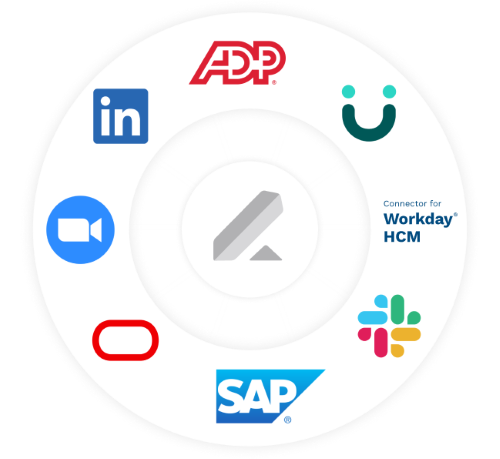
Key Integration and Compatibility Features of Lever:
- HRIS/HCM System Integration: Lever offers native integrations with several popular HRIS and HCM systems, including Workday, BambooHR, and ADP. These integrations allow for seamless data flow between the ATS and the core HR system, reducing manual data entry and ensuring consistency across platforms.
- Applicant Assessment Tools: The platform integrates with various skills assessment and personality testing tools, such as HackerRank, Codility, and Criteria Corp. These integrations enable recruiters to send assessments directly from Lever and receive results automatically.
- Background Check Services: Lever supports integration with background check providers like Checkr and HireRight, streamlining the verification process for new hires.
- Video Interviewing Platforms: The system offers integrations with popular video interviewing tools such as Zoom and Google Meet, facilitating easy scheduling and management of virtual interviews.
- Job Board Integrations: Lever connects with major job boards and aggregators, including Indeed, LinkedIn, and Glassdoor, allowing for efficient job posting and candidate sourcing.
- Calendar Synchronization: The platform integrates with common calendar applications like Google Calendar and Outlook, simplifying interview scheduling and coordination.
- API Access: Lever provides API access for custom integrations, allowing organizations to connect the ATS with their own internal systems or other third-party tools not covered by native integrations.
While Lever offers a solid range of integrations, some users note that the depth of certain integrations may be limited compared to more specialized recruitment systems.
Zoho Recruit Integration and Compatibility
Zoho Recruit offers extensive integration capabilities, leveraging its position within the broader Zoho ecosystem and providing connections to a wide array of third-party tools.
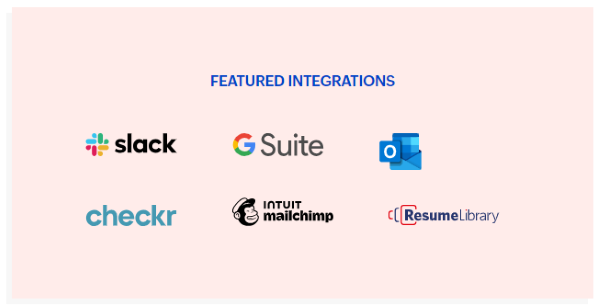
Key Integration and Compatibility Features of Zoho Recruit:
- Comprehensive HRIS/HCM Integration: Zoho Recruit integrates seamlessly with Zoho People (Zoho’s HRIS) and offers connections to other popular HCM systems like SAP SuccessFactors and Oracle HCM. These integrations provide deep data synchronization and workflow automation between recruitment and core HR functions.
- Extensive Zoho Ecosystem Integration: Being part of the Zoho suite, Zoho Recruit offers native integrations with other Zoho products, including Zoho CRM, Zoho Analytics, and Zoho Sign, providing a comprehensive business solution beyond just recruitment.
- Assessment and Screening Tools: The platform integrates with a wide range of assessment providers, including Codility, TestGorilla, and Mercer Mettl, allowing for seamless candidate evaluation within the ATS.
- Background Verification Services: Zoho Recruit supports integration with various background check providers, enabling automated verification processes as part of the hiring workflow.
- Video Interviewing and Scheduling: The system offers integrations with video conferencing tools like Zoom, Google Meet, and Microsoft Teams, as well as scheduling assistants like Calendly.
- Job Board and Social Media Integrations: Zoho Recruit connects with numerous job boards, social media platforms, and professional networks for efficient job posting and candidate sourcing.
- Advanced API and Webhook Support: The platform provides robust API access and webhook capabilities, allowing for complex custom integrations and real-time data synchronization with external systems.
- Zapier Integration: Zoho Recruit’s integration with Zapier opens up connections to thousands of other applications, greatly expanding its compatibility with various tools and services.
While Zoho Recruit offers extensive integration options, some users report that setting up and managing multiple integrations can be complex, especially for organizations with intricate tech stacks.
Comparison and Conclusion
In the Lever vs Zoho Recruit comparison of integration and compatibility features, both platforms offer strong solutions, but with different strengths that may appeal to different types of organizations.
Lever stands out for its user-friendly approach to integrations, with a focus on seamless connections to popular HR and recruitment tools. Its strengths lie in its straightforward setup process for common integrations and its ability to cover most essential recruitment-related connections. Lever may be particularly appealing to organizations that prioritize ease of use and quick implementation of core integrations.
Zoho Recruit, on the other hand, offers a more extensive and diverse set of integration options. Its deep integration within the Zoho ecosystem, combined with broad third-party tool compatibility and advanced API capabilities, make it a powerful choice for organizations with complex integration needs or those looking for a more comprehensive business solution.
In summary:
- Lever is well-suited for organizations seeking a straightforward integration approach that covers essential HR and recruitment tools effectively and is easy to set up and manage.
- Zoho Recruit is ideal for companies that need extensive integration capabilities, value being part of a broader business ecosystem, and potentially require more advanced or custom integrations.
When choosing between Lever vs Zoho Recruit for integration and compatibility, consider your organization’s existing tech stack, the complexity of your integration needs, and your plans for future system expansions. Both platforms offer strong integration features, but the best choice will depend on your specific requirements and the level of interconnectivity you need across your HR and business systems.
Customization and Scalability
When comparing Lever vs Zoho Recruit, the ability to customize the platform to fit specific needs and scale with growing organizations is crucial. Both systems offer various customization options and scalability features, but they approach these aspects differently. Let’s explore how each platform handles workflow customization and their capacity to manage high-volume hiring.
Lever Customization and Scalability
Lever provides a balance between customization and ease of use, aiming to offer flexibility without overwhelming users with complex options.
Key Customization and Scalability Features of Lever:
- Workflow Customization: Lever allows users to create custom hiring workflows tailored to different roles or departments. This includes the ability to add, remove, or reorder stages in the recruitment process, ensuring the system aligns with specific organizational needs.
- Custom Fields: The platform supports the creation of custom fields for both candidate profiles and job requisitions. This feature enables organizations to capture and track specific data points relevant to their unique hiring processes.
- Customizable Forms: Lever offers customizable application forms and interview feedback templates, allowing companies to gather the exact information they need from candidates and interviewers.
- Scalable Architecture: Designed to handle growing recruitment needs, Lever can accommodate organizations as they expand. The system is capable of managing increased user loads and higher volumes of candidates without significant performance degradation.
- Role-Based Access Control: As organizations grow, Lever’s role-based access control allows for fine-tuned permissions, ensuring that team members have appropriate access levels as the company structure becomes more complex.
- Bulk Actions: To support high-volume hiring, Lever includes bulk action features that allow recruiters to perform actions on multiple candidates simultaneously, improving efficiency in large-scale recruitment efforts.
While Lever offers good customization options, some users note that more advanced customizations may require support from Lever’s team or may not be as extensive as some enterprise-level solutions.
Zoho Recruit Customization and Scalability
Zoho Recruit is known for its extensive customization capabilities and robust scalability features, catering to organizations with complex and evolving recruitment needs.
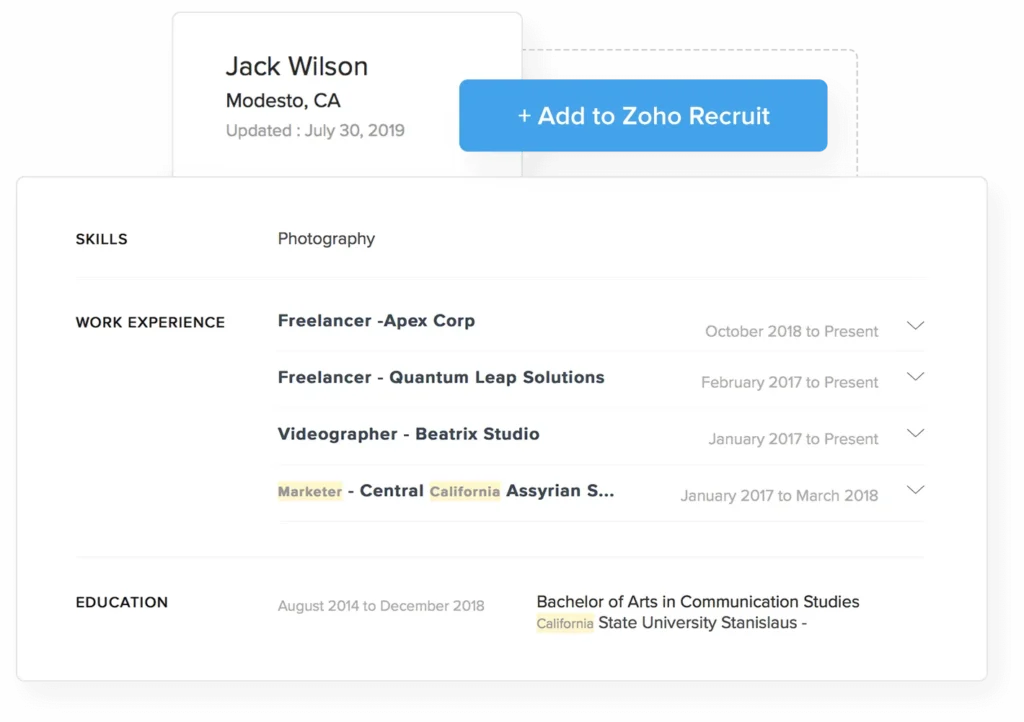
Key Customization and Scalability Features of Zoho Recruit:
- Advanced Workflow Customization: Zoho Recruit offers highly flexible workflow customization options. Users can create multiple, complex workflows for different hiring processes, including conditional stages and automated actions based on specific criteria.
- Extensive Custom Fields: The platform supports a vast array of custom fields, including text, number, date, lookup, and formula fields. This allows for highly detailed and specific data capture tailored to unique organizational requirements.
- Form Builder: Zoho Recruit includes a powerful form builder that allows for the creation of complex, multi-page application forms and assessment questionnaires.
- Scalable Infrastructure: Built on Zoho’s robust infrastructure, Zoho Recruit is designed to handle high volumes of data and users. It can scale effectively to support large enterprises with multiple departments and global operations.
- Customizable User Roles and Permissions: The system offers granular control over user roles and permissions, allowing organizations to create custom roles that align precisely with their organizational structure and security requirements.
- Automation for High-Volume Hiring: Zoho Recruit provides extensive automation features, including candidate screening, interview scheduling, and communication, which are particularly beneficial for managing high-volume recruitment efficiently.
- Custom Reports and Dashboards: Users can create highly customized reports and dashboards, allowing for tailored analytics and insights as recruitment needs grow and evolve.
While Zoho Recruit offers extensive customization options, some users report that the initial setup and configuration process can be complex, especially for organizations with very specific or unique requirements.
Comparison and Conclusion
In the Lever vs Zoho Recruit comparison of customization and scalability features, both platforms offer strong solutions but with different emphases that may appeal to different types of organizations.
Lever stands out for its user-friendly approach to customization and scalability. Its strengths lie in providing a good balance between flexibility and ease of use, making it accessible for organizations that need moderate levels of customization without requiring extensive technical expertise. Lever’s scalability features are designed to grow smoothly with expanding organizations, maintaining performance and usability.
Zoho Recruit, on the other hand, offers more extensive and advanced customization options. Its highly flexible workflow customization, extensive custom fields, and powerful form builder make it suitable for organizations with complex or unique recruitment processes. Zoho Recruit’s scalability features are robust, capable of supporting large enterprises with diverse and evolving recruitment needs.
In summary:
- Lever is well-suited for organizations seeking a customizable and scalable solution that balances flexibility with ease of use. It’s particularly appealing for companies that want to grow and adapt their recruitment processes without dealing with overly complex customizations.
- Zoho Recruit is ideal for companies that require highly detailed customization options and have the resources to configure and maintain a more complex system. It’s especially suitable for large enterprises or organizations with unique, multi-faceted recruitment processes that require extensive tailoring.
When choosing between Lever vs Zoho Recruit for customization and scalability, consider your organization’s current size, projected growth, and the complexity of your recruitment processes. Also, factor in your team’s technical capabilities and the level of customization you truly need. Both platforms offer strong customization and scalability features, but the best choice will depend on your specific requirements and how much flexibility and complexity you’re willing to manage in your recruitment system.
AI and Automation Features
As the recruitment landscape evolves, AI and automation features have become increasingly important in Applicant Tracking Systems (ATS). When comparing Lever vs Zoho Recruit, it’s crucial to examine how each platform leverages these technologies to enhance the hiring process. Let’s explore the AI-powered candidate matching and automated screening and scheduling capabilities of both systems.
Lever AI and Automation Features
Lever incorporates AI and automation to streamline various aspects of the recruitment process, focusing on efficiency and data-driven decision-making.
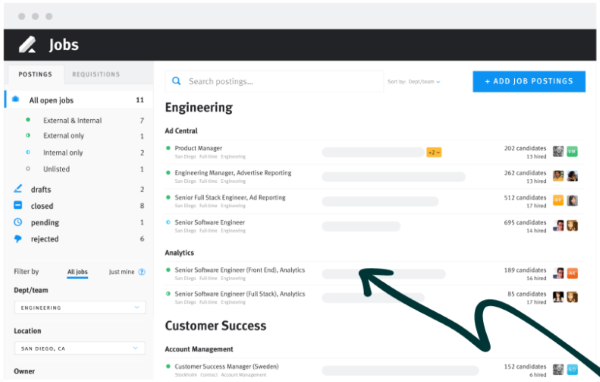
Key AI and Automation Features of Lever:
- AI-Powered Candidate Matching: Lever uses machine learning algorithms to analyze candidate profiles and job requirements, providing recruiters with a list of the most suitable candidates for each position. This feature helps save time and improves the quality of candidate shortlists.
- Automated Screening: The platform offers initial candidate screening based on predefined criteria, automatically filtering out applicants who don’t meet the basic requirements. This helps recruiters focus their efforts on the most promising candidates.
- Intelligent Scheduling: Lever’s scheduling automation integrates with calendar systems to find optimal interview times, reducing the back-and-forth typically associated with scheduling. The system can also automatically send reminders to both candidates and interviewers.
- Predictive Analytics: Lever employs AI to analyze historical hiring data, providing insights into the most effective sourcing channels and predicting time-to-hire for different roles.
- Automated Email Campaigns: The system can automatically send personalized email sequences to candidates based on their stage in the hiring process, improving candidate engagement without manual intervention.
While Lever’s AI and automation features are effective for streamlining basic recruitment tasks, some users note that more advanced AI capabilities may be limited compared to specialized AI recruitment tools.
Zoho Recruit AI and Automation Features
Zoho Recruit offers a comprehensive suite of AI and automation features, leveraging advanced technologies to enhance various aspects of the recruitment process.
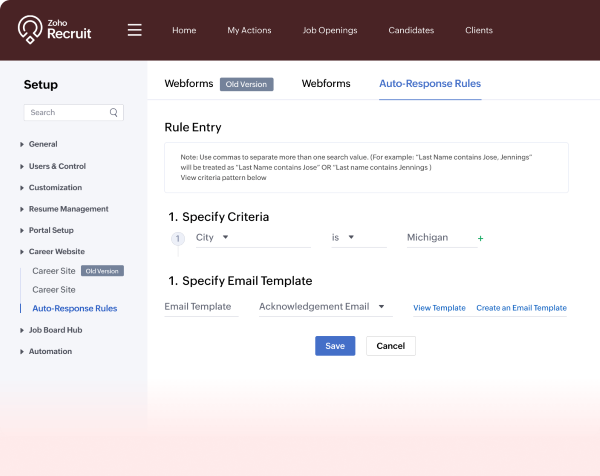
Key AI and Automation Features of Zoho Recruit:
- Advanced AI-Powered Candidate Matching: Zoho Recruit uses sophisticated AI algorithms to match candidates with job openings, considering not just skills and experience but also factors like cultural fit and career trajectory. The system learns from hiring decisions to improve its matching accuracy over time.
- Intelligent Resume Parsing: The platform employs natural language processing (NLP) to extract and categorize information from resumes accurately, populating candidate profiles automatically and consistently.
- Automated Candidate Screening and Ranking: Zoho Recruit’s AI can automatically screen and rank candidates based on multiple criteria, including skills, experience, and even sentiment analysis from previous interactions.
- Chatbots for Candidate Interaction: The system offers AI-powered chatbots that can handle initial candidate queries, schedule interviews, and even conduct preliminary screenings, significantly reducing the workload on recruiters.
- Predictive Analytics and Insights: Zoho Recruit uses machine learning to analyze recruitment data, providing predictive insights on candidate success, time-to-hire, and potential bottlenecks in the hiring process.
- Automated Workflow Triggers: The platform allows for the creation of complex, automated workflows triggered by specific events or criteria, streamlining the entire recruitment process from application to offer.
While Zoho Recruit offers extensive AI and automation capabilities, some users report that fully leveraging these advanced features may require a significant initial setup and learning curve.
Comparison and Conclusion
In the Lever vs Zoho Recruit comparison of AI and automation features, both platforms offer solutions to enhance the recruitment process, but with different levels of sophistication and focus.
Lever stands out for its user-friendly approach to AI and automation, focusing on streamlining core recruitment tasks effectively. Its strengths lie in its intuitive AI-powered candidate matching, automated screening, and intelligent scheduling features. Lever may be particularly appealing to organizations looking for a balance between AI-enhanced recruitment and ease of use.
Zoho Recruit, on the other hand, offers more advanced and comprehensive AI and automation capabilities. Its sophisticated candidate matching algorithms, intelligent resume parsing, and extensive use of AI across various recruitment functions make it a powerful choice for organizations looking to leverage AI extensively in their hiring processes.
In summary:
- Lever is well-suited for organizations seeking to incorporate AI and automation into their recruitment process in a straightforward, easy-to-implement manner. It’s particularly appealing for companies that want to enhance their hiring efficiency without dealing with overly complex AI systems.
- Zoho Recruit is ideal for companies that want to leverage advanced AI and automation capabilities extensively in their recruitment process. It’s especially suitable for organizations with complex hiring needs or those looking to implement a highly data-driven, AI-enhanced recruitment strategy.
When choosing between Lever vs Zoho Recruit for AI and automation features, consider your organization’s specific needs, the level of AI sophistication required, and your team’s capacity to implement and manage advanced AI-driven processes. Both platforms offer valuable AI and automation features, but the best choice will depend on your specific requirements and how deeply you want to integrate AI into your recruitment workflow.
Candidate Experience
In the competitive job market, providing an excellent candidate experience is crucial for attracting top talent. When comparing Lever vs Zoho Recruit, it’s essential to examine how each platform enhances the applicant journey. Let’s explore how these systems approach application process simplicity and communication mechanisms with candidates.
Lever Candidate Experience
Lever places a strong emphasis on creating a positive and engaging candidate experience throughout the recruitment process.
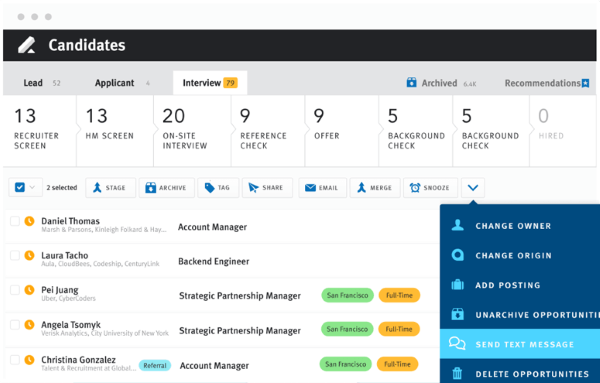
Key Candidate Experience Features of Lever:
- Streamlined Application Process: Lever offers a user-friendly, mobile-responsive application interface that allows candidates to apply quickly and easily. The system supports one-click applications and resume parsing, reducing the time and effort required from applicants.
- Branded Career Pages: The platform provides customizable career pages that reflect the company’s brand and culture, offering candidates a cohesive experience from job search to application.
- Candidate Portal: Lever includes a candidate portal where applicants can check their application status, update their information, and view any pending tasks or assessments.
- Automated Communication: The system supports automated email notifications to keep candidates informed about their application status, upcoming interviews, and next steps in the process.
- Interview Scheduling: Lever’s self-service interview scheduling allows candidates to choose interview times that work best for them, reducing scheduling conflicts and improving the overall experience.
- Feedback Mechanism: The platform includes features for collecting candidate feedback about the recruitment process, helping organizations continuously improve their candidate experience.
While Lever’s candidate experience features are generally well-received, some users note that more advanced customization options for the candidate journey may be limited compared to some specialized candidate experience platforms.
Zoho Recruit Candidate Experience
Zoho Recruit offers a comprehensive set of features designed to create a seamless and engaging candidate experience throughout the hiring process.
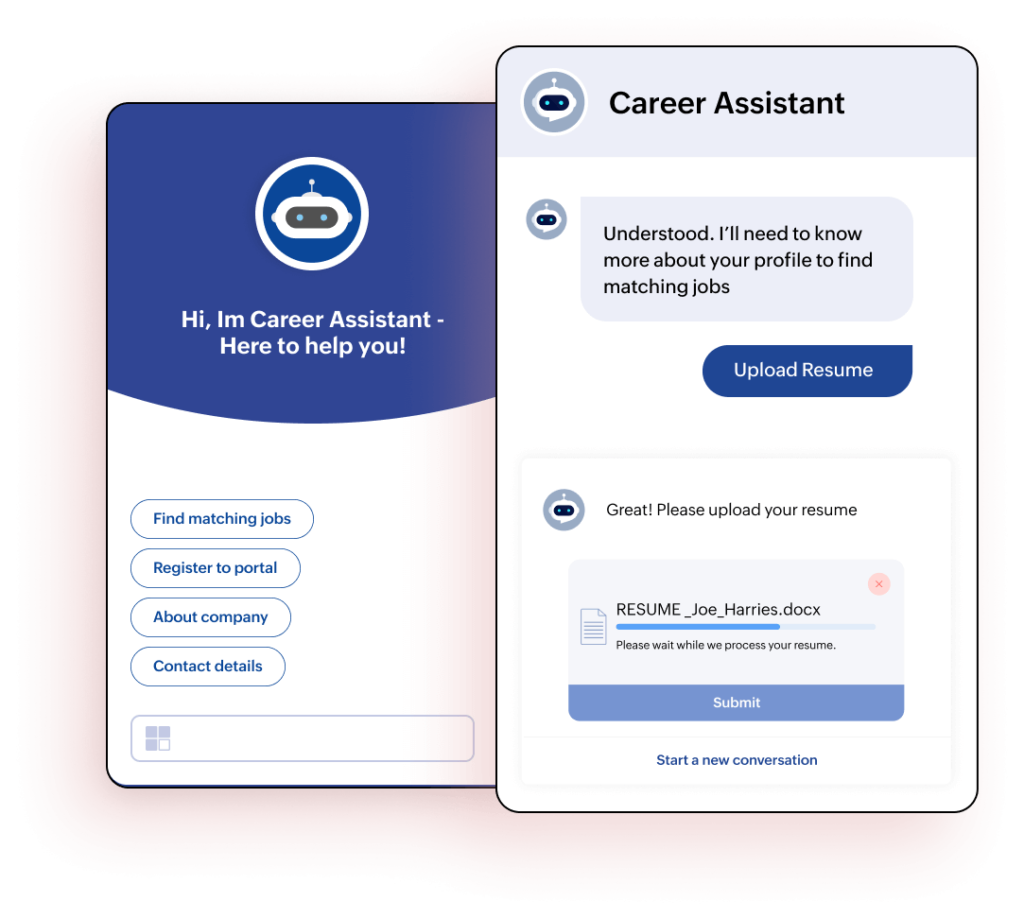
Key Candidate Experience Features of Zoho Recruit:
- Intuitive Application Process: Zoho Recruit provides a smooth, mobile-optimized application process with features like social media profile importing and resume parsing to simplify the application submission.
- Customizable Career Sites: The platform offers highly customizable career site builders, allowing organizations to create branded, interactive job portals that showcase their company culture and values.
- Advanced Candidate Portal: Zoho Recruit’s candidate portal is feature-rich, allowing applicants to track their application status, schedule interviews, complete assessments, and communicate directly with recruiters.
- AI-Powered Chatbots: The system includes AI-driven chatbots that can answer candidate queries in real-time, provide application assistance, and even conduct initial screenings.
- Personalized Communication: Zoho Recruit supports personalized, automated communication workflows that can be tailored to different stages of the hiring process, ensuring candidates receive relevant and timely information.
- Video Interviewing Integration: The platform integrates with various video interviewing tools, providing a seamless experience for remote interviews and assessments.
- Candidate Relationship Management: Zoho Recruit includes features for nurturing relationships with candidates over time, even if they’re not immediately hired, improving long-term engagement.
While Zoho Recruit offers extensive candidate experience features, some users report that the initial setup and customization of these features can be complex, especially for organizations with unique candidate journey requirements.
Comparison and Conclusion
In the Lever vs Zoho Recruit comparison of candidate experience features, both platforms offer strong solutions to enhance the applicant journey, but with different strengths that may appeal to different types of organizations.
Lever stands out for its user-friendly and streamlined approach to candidate experience. Its strengths lie in providing a clean, intuitive application process and effective communication tools. Lever may be particularly appealing to organizations that prioritize simplicity and want to quickly implement a solid candidate experience without extensive customization.
Zoho Recruit, on the other hand, offers a more feature-rich and highly customizable candidate experience. Its advanced candidate portal, AI-powered chatbots, and extensive personalization options make it a powerful choice for organizations looking to create a highly tailored and interactive candidate journey.
In summary:
- Lever is well-suited for organizations seeking a straightforward, easy-to-implement candidate experience solution that covers the essentials effectively. It’s particularly appealing for companies that want to enhance their candidate experience quickly without dealing with complex setups.
- Zoho Recruit is ideal for companies that need detailed control over their candidate experience and value extensive customization options. It’s especially suitable for organizations with complex hiring processes or those looking to create a highly personalized and interactive candidate journey.
When choosing between Lever vs Zoho Recruit for candidate experience, consider your organization’s specific needs, the level of customization you require, and your resources for managing a more complex system. Both platforms offer strong candidate experience features, but the best choice will depend on your unique requirements and how much you want to tailor the candidate journey to your specific brand and process.
Customer Support and Service
When comparing Lever vs Zoho Recruit, the quality of customer support and service can significantly impact user satisfaction and the overall effectiveness of the ATS implementation. Let’s examine how each platform approaches customer support, including training, onboarding assistance, and ongoing service quality.
Lever Customer Support and Service
Lever is known for its commitment to customer success and provides various support options to ensure users can effectively utilize their platform.

Key Customer Support and Service Features of Lever:
- Onboarding Support: Lever offers dedicated onboarding assistance to help new customers set up their system and configure it to their specific needs. This includes personalized guidance on best practices and system optimization.
- Training Resources: The platform provides a comprehensive knowledge base, video tutorials, and webinars to help users learn the system. These resources cover various topics from basic functionality to advanced features.
- Customer Success Managers: Depending on the plan, Lever assigns customer success managers to accounts, offering personalized support and strategic advice on optimizing recruitment processes.
- Technical Support: Lever provides technical support through multiple channels, including email, phone, and chat. Response times vary based on the urgency of the issue and the customer’s plan level.
- Community Forum: Users can access a community forum where they can connect with other Lever customers, share best practices, and find solutions to common issues.
- Regular Updates and Communication: Lever maintains consistent communication about product updates, new features, and system improvements, ensuring customers are always informed about the latest developments.
While Lever’s customer support is generally well-regarded, some users note that response times for non-critical issues can sometimes be longer than desired, especially for users on lower-tier plans.
Zoho Recruit Customer Support and Service
Zoho Recruit offers a comprehensive support system, leveraging Zoho’s extensive experience in customer service across its suite of products.

Key Customer Support and Service Features of Zoho Recruit:
- Extensive Onboarding Process: Zoho Recruit provides thorough onboarding support, including system setup, data migration assistance, and initial training sessions tailored to the organization’s needs.
- Multi-Channel Support: The platform offers support through various channels, including email, phone, chat, and a ticketing system. This multi-channel approach ensures users can get help in their preferred manner.
- Comprehensive Documentation: Zoho Recruit maintains an extensive knowledge base, user guides, and video tutorials covering all aspects of the system, from basic operations to advanced configurations.
- Customized Training Programs: For enterprise clients, Zoho offers customized training programs that can be tailored to specific roles within the organization, ensuring all users are proficient with the tools relevant to their responsibilities.
- 24/7 Support Options: Depending on the plan, Zoho Recruit offers 24/7 support for critical issues, ensuring that customers can get assistance at any time.
- Regular Webinars and Workshops: Zoho conducts regular webinars and workshops on various topics related to Zoho Recruit, helping users stay updated on new features and best practices.
- Community Support: Zoho maintains an active user community where customers can share experiences, ask questions, and get advice from both Zoho experts and fellow users.
While Zoho Recruit’s support is comprehensive, some users report that the initial response times can vary, and resolving complex issues may sometimes require escalation through multiple support tiers.
Comparison and Conclusion
In the Lever vs Zoho Recruit comparison of customer support and service, both platforms offer strong support systems, but with different strengths that may appeal to different types of organizations.
Lever stands out for its personalized approach to customer support, particularly through its customer success managers and tailored onboarding process. Its strengths lie in providing strategic guidance and ensuring customers can effectively leverage the platform to meet their specific recruitment goals.
Zoho Recruit, on the other hand, offers a more extensive and diverse range of support options. Its multi-channel support, comprehensive documentation, and regular training programs make it a solid choice for organizations that value having access to a wide array of support resources.
In summary:
- Lever is well-suited for organizations that prioritize personalized support and strategic guidance. It’s particularly appealing for companies that want a more hands-on approach to customer success and value building a relationship with their ATS provider.
- Zoho Recruit is ideal for companies that need access to a wide range of support options and extensive self-help resources. It’s especially suitable for organizations with diverse support needs or those who prefer having multiple channels for getting assistance.
When choosing between Lever vs Zoho Recruit for customer support and service, consider your organization’s specific support needs, the level of hands-on assistance you require, and your team’s capacity for self-learning. Both platforms offer strong customer support features, but the best choice will depend on your preferred support style and the level of guidance you need in implementing and maintaining your ATS.
Pricing and Cost-effectiveness
When comparing Lever vs Zoho Recruit, understanding the pricing models and overall cost-effectiveness is crucial for organizations to make an informed decision. Both platforms offer different pricing structures and value propositions, which can significantly impact the return on investment (ROI) for companies of various sizes and recruitment needs.
Lever Pricing and Cost-effectiveness
Lever offers a tiered pricing model that scales with the size and needs of the organization.
Key Pricing and Cost-effectiveness Features of Lever:
- Pricing Model: Lever typically uses a per-employee, per-year pricing structure. This model can be beneficial for organizations with stable employee counts but may lead to higher costs for rapidly growing companies.
- Tiered Plans: Lever offers several tiers, usually including:
- Core: Basic ATS functionality
- Professional: Advanced features and automation
- Enterprise: Full suite of features, including advanced analytics and customizations
- Custom Pricing: For larger organizations or those with unique needs, Lever offers custom pricing plans.
- Minimum Contract Length: Lever often requires annual contracts, which can be a consideration for companies looking for more flexible terms.
- ROI Considerations:
- Streamlined hiring process potentially leading to reduced time-to-hire
- Improved candidate quality through better sourcing and screening tools
- Enhanced collaboration features that can increase hiring team efficiency
While Lever’s pricing is competitive for its feature set, some smaller organizations or those with limited hiring needs may find it more expensive compared to simpler ATS solutions.
For more information about pricing, please visit Lever’s website.
Zoho Recruit Pricing and Cost-effectiveness
Zoho Recruit offers a flexible pricing structure that caters to a wide range of organization sizes and types.
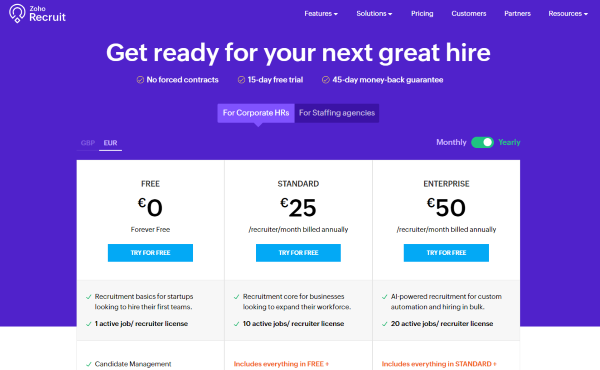
Key Pricing and Cost-effectiveness Features of Zoho Recruit:
- Pricing Model: Zoho Recruit uses a per-user, per-month pricing structure. This can be more cost-effective for smaller teams or organizations with fluctuating recruitment needs.
- Multiple Plans: Zoho Recruit typically offers several plans, including:
- Standard: Basic recruitment features
- Professional: Advanced features and customization options
- Enterprise: Full suite of features, including AI-powered tools and advanced analytics
- Free Plan: Zoho Recruit offers a free plan for very small teams or individual recruiters, which can be a good starting point for small businesses.
- Flexible Billing: Zoho often provides options for monthly or annual billing, with discounts for annual commitments.
- Add-ons and Integrations: Some advanced features or integrations may require additional fees, allowing organizations to customize their package based on specific needs.
- ROI Considerations:
- Comprehensive feature set that can grow with the organization
- Integration with other Zoho products for a more cohesive business solution
- Automation features that can significantly reduce manual work in the recruitment process
While Zoho Recruit’s pricing can be very competitive, especially for smaller teams, organizations need to carefully consider potential add-on costs for advanced features or integrations.
For more information about pricing, se visit Zoho Recruit’s website.
Comparison and Conclusion
In the Lever vs Zoho Recruit comparison of pricing and cost-effectiveness, both platforms offer value but with different approaches that may suit different types of organizations.
Lever’s pricing model is generally more suited to medium to large organizations with stable or growing employee counts. Its per-employee pricing can offer good value for companies that make extensive use of the platform across their workforce. The focus on streamlined processes and collaboration can lead to significant efficiency gains, potentially justifying the investment for organizations with high-volume recruiting needs.
Zoho Recruit’s pricing structure is more flexible and can be particularly attractive to small to medium-sized businesses or organizations with variable recruiting needs. The per-user model allows for more precise control over costs, and the availability of a free tier can be a significant advantage for very small teams or those just starting to formalize their recruitment processes.
In summary:
- Lever may be more cost-effective for:
- Medium to large organizations with stable or growing workforces
- Companies that value a comprehensive, all-in-one solution and are willing to commit to annual contracts
- Organizations with high-volume recruiting needs that can leverage Lever’s efficiency gains
- Zoho Recruit may offer better value for:
- Small to medium-sized businesses or those with fluctuating recruitment needs
- Organizations that prefer a modular approach and want to pay only for the features they need
- Companies already using other Zoho products, benefiting from integration efficiencies
When choosing between Lever vs Zoho Recruit based on pricing and cost-effectiveness, carefully consider your organization’s size, recruitment volume, budget constraints, and long-term growth plans. Also, factor in the potential ROI from efficiency gains and improved hiring outcomes. While initial costs are important, the long-term value and alignment with your organization’s needs should be the primary drivers in your decision-making process.
User Reviews and Testimonials
When comparing Lever vs Zoho Recruit, user reviews and testimonials provide valuable insights into real-world experiences with these Applicant Tracking Systems (ATS). Let’s explore feedback from recruiters, HR professionals, and candidates to gain a comprehensive understanding of how these platforms perform in practice.

Lever User Reviews and Testimonials
Lever generally receives positive feedback for its user-friendly interface and collaborative features.
Key Points from Lever Reviews:
- User Interface: Many users praise Lever’s intuitive and clean interface, noting that it’s easy to navigate even for non-technical users.
- Collaboration Tools: Recruiters frequently highlight Lever’s strong collaboration features, appreciating the ability to easily share candidate information and feedback with hiring teams.
- Candidate Experience: Several reviews mention that candidates find Lever’s application process smooth and user-friendly.
- Integration Capabilities: Users often commend Lever’s integration with other HR tools and job boards, streamlining their overall recruitment process.
- Customer Support: Many customers report positive experiences with Lever’s support team, citing responsiveness and helpfulness.
- Areas for Improvement: Some users mention that advanced reporting features could be enhanced, and a few note that certain customizations require support from Lever’s team.
Testimonial example: “Lever has transformed our hiring process. Its intuitive interface and powerful collaboration tools have significantly reduced our time-to-hire and improved the quality of our candidates.” – HR Director at a mid-size tech company
Zoho Recruit User Reviews and Testimonials
Zoho Recruit receives praise for its comprehensive feature set and customization options.
Key Points from Zoho Recruit Reviews:
- Customization: Many users appreciate Zoho Recruit’s high level of customizability, allowing them to tailor the system to their specific recruitment processes.
- Feature-Rich Platform: Recruiters often comment on the wide range of features available, covering all aspects of the recruitment lifecycle.
- Integration with Zoho Ecosystem: Users who utilize other Zoho products highlight the seamless integration, creating a cohesive business solution.
- Pricing: Several reviews mention Zoho Recruit’s competitive pricing, especially for small to medium-sized businesses.
- Learning Curve: Some users note that the platform’s extensive features can lead to a steeper learning curve, particularly for new users.
- Customer Support: While many praise the support, a few reviews mention occasional delays in response times for complex issues.
Testimonial example: “Zoho Recruit has been a game-changer for our recruitment team. The level of customization and automation has allowed us to handle a much higher volume of applications efficiently.” – Recruitment Manager at a large retail company
Candidate Testimonials
It’s important to consider the candidate perspective when evaluating an ATS:
- Lever candidates often praise the simplicity of the application process and the clear communication throughout their journey.
- Zoho Recruit receives positive feedback for its user-friendly career portals and the ability to easily track application status.
Comparison and Conclusion
In the Lever vs Zoho Recruit comparison of user reviews and testimonials, both platforms receive generally positive feedback, but with different strengths highlighted:
- Lever is consistently praised for its user-friendly interface, strong collaboration features, and positive candidate experience. It seems to be particularly well-received by teams that value simplicity and efficiency in their recruitment process.
- Zoho Recruit stands out for its comprehensive feature set, high customizability, and integration capabilities within the Zoho ecosystem. It appears to be favored by organizations looking for a highly tailored recruitment solution.
In summary:
- Consider Lever if your organization prioritizes ease of use, team collaboration, and a streamlined candidate experience. It’s often recommended for teams that want a quick-to-implement, user-friendly solution.
- Choose Zoho Recruit if you need a highly customizable platform with a wide range of features and prefer a solution that can integrate seamlessly with other business tools, especially within the Zoho ecosystem.
When making your decision between Lever vs Zoho Recruit, consider these user reviews alongside your specific organizational needs, team structure, and long-term recruitment goals. Remember that while reviews provide valuable insights, your unique requirements should be the primary driver in choosing the right ATS for your organization.
Conclusion
In the comparison of Lever vs Zoho Recruit, both Applicant Tracking Systems (ATS) offer robust solutions tailored to meet the diverse needs of organizations seeking to optimize their recruitment processes. Each platform has its unique strengths, making them suitable for different types of businesses and recruitment strategies.
Lever excels in providing a user-friendly interface and strong collaboration features, making it particularly appealing for teams that prioritize simplicity and efficiency. Its focus on enhancing the candidate experience and facilitating teamwork can lead to improved hiring outcomes, especially for medium to large organizations with stable recruitment needs.
On the other hand, Zoho Recruit stands out for its extensive customization options and comprehensive feature set. Its ability to integrate seamlessly with other Zoho products and third-party tools makes it an excellent choice for organizations looking for a highly tailored recruitment solution. The competitive pricing structure also positions Zoho Recruit as a cost-effective option for small to medium-sized businesses that require flexibility in their hiring processes.
Ultimately, the right choice between Lever and Zoho Recruit will depend on your organization’s specific needs, including your team size, recruitment volume, budget constraints, and the level of customization you require.
As you evaluate these platforms, consider factors such as:
- User Experience: Which platform aligns better with your team’s technical expertise and ease of use?
- Customization Needs: Do you require extensive customization options to fit unique recruitment workflows?
- Integration Capabilities: How important is it for your ATS to integrate with other HR tools or business systems?
- Budget Considerations: What pricing model best suits your organization’s financial strategy?
By carefully assessing these factors and leveraging user reviews and testimonials, you can make an informed decision that enhances your recruitment strategy and supports your organization’s growth. Whether you choose Lever or Zoho Recruit, both platforms have the potential to significantly improve your hiring processes and candidate engagement.
![]()
![]() Read our full Lever review
Read our full Lever review
![]()
![]() Read our full Zoho Recruit review
Read our full Zoho Recruit review

